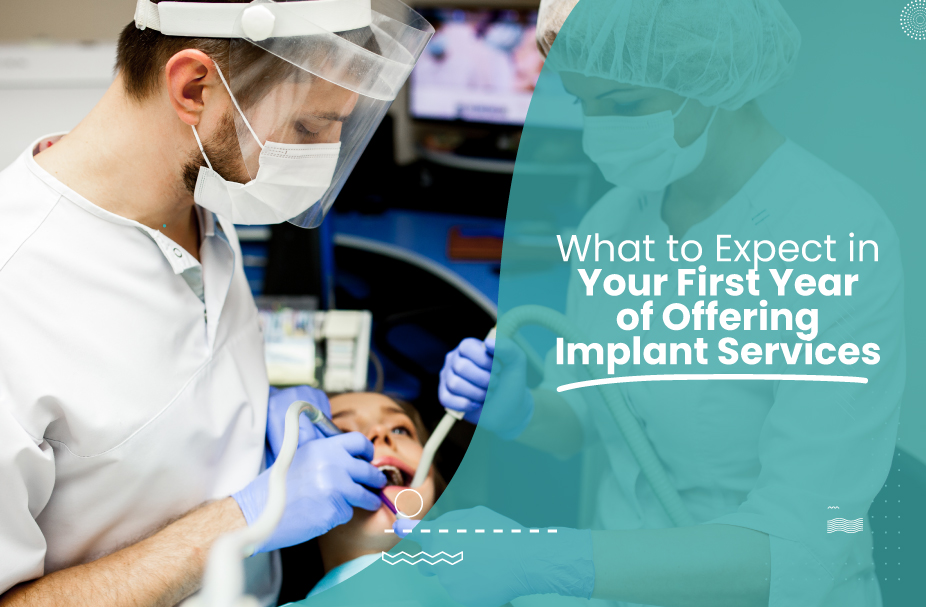
Adding dental implants to your practice is an exciting way to expand what you offer, bring in new patients, and raise the level of care for those you serve. But, like any new thing, your first year as a dental implant expert can make you nervous because you don’t really know what to expect in terms of challenges and rewards.
This roadmap is designed to help you gain confidence, set patient expectations, and tackle occasional hurdles, all while building your skills and growing your practice.

1. Building Confidence in Patient Consultations
Your first step in creating a positive implant experience starts with patient consultations. These can make all the difference in setting expectations and building trust. Here’s how to excel at them:
Keep It Simple
The implant process can feel overwhelming for patients, so your goal should be to ease them as much as possible. To do this, you can break down the steps in plain language, avoiding technical jargon. Walk patients through what to expect at each stage, from surgery timing to the healing process. Knowing what’s ahead helps patients feel prepared and more satisfied overall.
Plus, you can focus on the benefits they care most about, like improved function, better aesthetics, and a lasting impact on their oral health.
Be Upfront About Costs
Implants are an investment, so transparency about pricing and financing options is always the best possible move. Explain the long-term value of implants, positioning them as a worthwhile choice for lasting results which is, after all, the truth.
2. Investing in Continued Learning and Mentorship
The learning doesn’t stop once you offer implants. Building this new service can sometimes mean seeking out continued education and mentorship to support you through complex cases.
Take Advanced Courses
To do this, you can find courses that dive into specific implant techniques, like bone grafting or sinus lifts, to handle a wider range of cases with confidence. Besides, the best thing about these courses is that, more often than not, they provide mentorship! This can be invaluable, especially during your early cases, because a mentor can help guide you through tricky situations and troubleshoot along the way.
But it’s not just about your teachers: professional implant groups connect you with other specialists, research, and techniques to keep you on the cutting edge of advancements.
3. Focusing on Efficiency and Patient Comfort
Implant procedures are detailed and involve multiple steps, so learning to balance efficiency with patient comfort is crucial for not only them, but you.
Plan Appointments Thoughtfully
Implant procedures take time, so pacing your appointments helps prevent rushing, keeping your schedule on track and enhancing the patient experience.
Prioritize Comfort
As with any surgery, implant surgery can feel intimidating. So, to help patients you can offer options for sedation, discuss relaxation techniques, and provide thorough aftercare instructions to put them at ease.
Keep Your Setup Efficiently
A thing most dentists overlook is organizing their tools and materials to be easily accessible. Keeping them at arm’s-length can make the whole process smoother, as well as considering training an assistant in implant-specific tasks. A well-prepped environment can make a big difference for both you and your patients.

4. Handling Complications with Confidence
Though rare, complications can happen, and preparing in advance for them makes sure you’re ready to manage these situations smoothly and reassure your patients. Therefore, in the rare case of issues like infection or implant failure, besides knowing how to handle those situations, having an after-hours contact or emergency instructions can provide peace of mind for everyone.
Establish a Post-Op Plan
You can create a standard post-surgery care protocol and ensure your team knows it well. How does this help? When patients understand how to handle typical post-op discomfort, they’re likely to feel more at ease.
Stay Updated on Solutions
If you feel like you can polish your techniques in case anything does happen, many implant courses cover managing complications. Keeping current on these techniques helps you feel prepared to respond if any issues arise.
5. Creating a Supportive Follow-Up System
Following up is essential for successful outcomes and can help build loyalty with your implant patients. Why? Simply put, a structured follow-up system makes sure healing goes smoothly and leaves patients feeling cared for. And, since most implant cases require a few follow-up visits, booking these appointments before patients leave helps keep them on track. A simple call or reminder can be reassuring to patients anxious about healing! Early follow-up also helps you catch and resolve any issues sooner rather than later.
Provide Clear Aftercare Instructions
Besides scheduling follow-up visits, send patients home with easy-to-follow instructions they can refer to, helping prevent complications and making the healing process smoother.
6. Promoting Your Implant Services
Once you’re comfortable offering implant services, it’s time to spread the word! Many patients may not realize this option is available, so it’s important to get the message out. Here’s how you can do this:
- Reach Out to Existing Patients: Promote your implant services in-office, on your website, and in newsletters. Some of your current patients might be good candidates without even knowing it.
- Offer No-Cost Consultations: A free consultation lets potential patients learn about implants without committing upfront, making it easier to answer their questions and build rapport.
- Share Success Stories: With consent, share testimonials, reviews and before-and-after photos to show the positive impact of implants. These real-life stories can help new patients feel more comfortable choosing you for their implant needs.
7. Tracking and Analyzing Results
As you get more experience with implants, keeping track of your results will give you the insights you need to know how to improve patient outcomes and experiences. This is incredibly important because, with these, you can refine your approach over time. Here are a few trends to keep in mind:
Monitor Key Metrics
Track things like consultation-to-treatment rates, follow-up visits, and any complications. Spotting patterns helps you find areas to improve.
Collect Patient Feedback
Patients who go through the implant process can provide valuable feedback that can show you ways to make the experience smoother and more satisfying.
Refine as You Go
The first year with implants is a learning journey. Take feedback seriously and use it to adjust your approach, whether it’s tweaking your consultation style or improving follow-up care.
Final Thoughts A Rewarding Journey in Implantology
Your first year with dental implants will be both challenging and incredibly rewarding. With a focus on clear communication, continuous learning, and efficient procedures, you’re laying the foundation for a successful, patient-centered practice. Over time, this approach can increase patient satisfaction, attract referrals, and support consistent growth in your practice.
As your confidence and expertise grow, dental implants can become a cornerstone of your practice, helping you attract new patients, broaden your professional capabilities and build a rewarding career in implantology.
